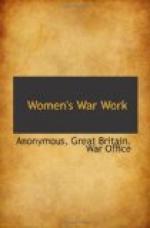The problem before us is the problem of finding ten times the amount of money we did before the war for National purposes. We are spending over $30,000,000 a day. By our taxations, which includes an 80 per cent tax on excess profits, we are raising over 25 per cent of our total expenditure. We have met some other part of our expenditure in the three years of war by using our gold reserve very heavily; a great deal of it in payments in America, where you now possess more than a third of the gold of the entire world. We have also used a portion of our securities, our capital wealth and past savings, and we have had to borrow heavily. Our National Debt is now L4,000,000,000. It was L700,000,000 at the outbreak of war. L1,000,000,000 has been lent to our Allies and the Dominions.
Numbers of people have an impression that Governments can find money. They can, to a certain extent, but only in a very limited way, without great harm. There is in this creation an addition to the buying power of the community, but if everybody goes on spending no addition to the productive power, so it only creates high prices and hardship. The inflation of currency caused by it is a risk and an evil. The sound way is to get the money by taxation, from resources and in real voluntary loans.
America’s burden is very much the same as our own, and the need here also of voluntary saving and lending to the extent of more than half the expenditure is clear. America, like ourselves, is very wisely trying to democratise its war loans. Nothing is wiser or sounder or more calculated to make progress, and the changes after the war which will come, sound and steady than widely-spread, democratically-subscribed loans. These vast debts will have to be paid by the ability, productiveness and work of all, so it is in the highest degree desirable that the money and interest to be paid back should go out to every class of the community—and not only to small sections. It is well to remember, too, that the country that goes to the peace table financially sound is in a position to make better terms.
[Illustration: ONE OF THE POSTERS RECENTLY ISSUED BY THE NATIONAL WAR SAVINGS COMMITTEE]
But the purely financial side of war savings is not the most important one. We talk in terms of money but the reality is not money but goods and services. The problem before our Governments and the problem that cannot be left to our children (though the debts incurred in securing the credits may be) is the problem of finding every day over $30,000,000 worth of material and labour for the struggle. War savings among the people is not only essential to secure the money needed—it is far more essential from the point of view of securing the cutting down of the consumption of goods and labour by our peoples.




